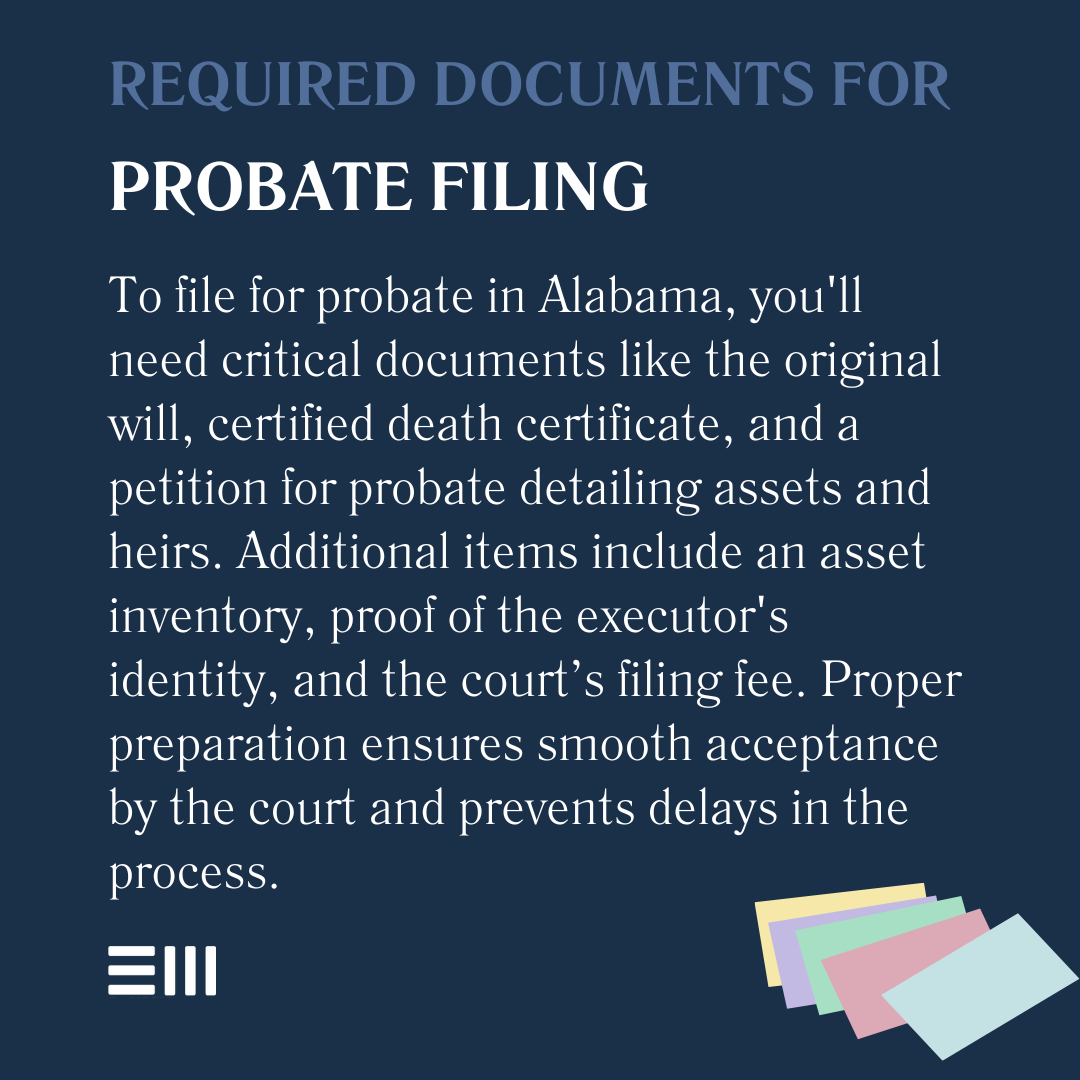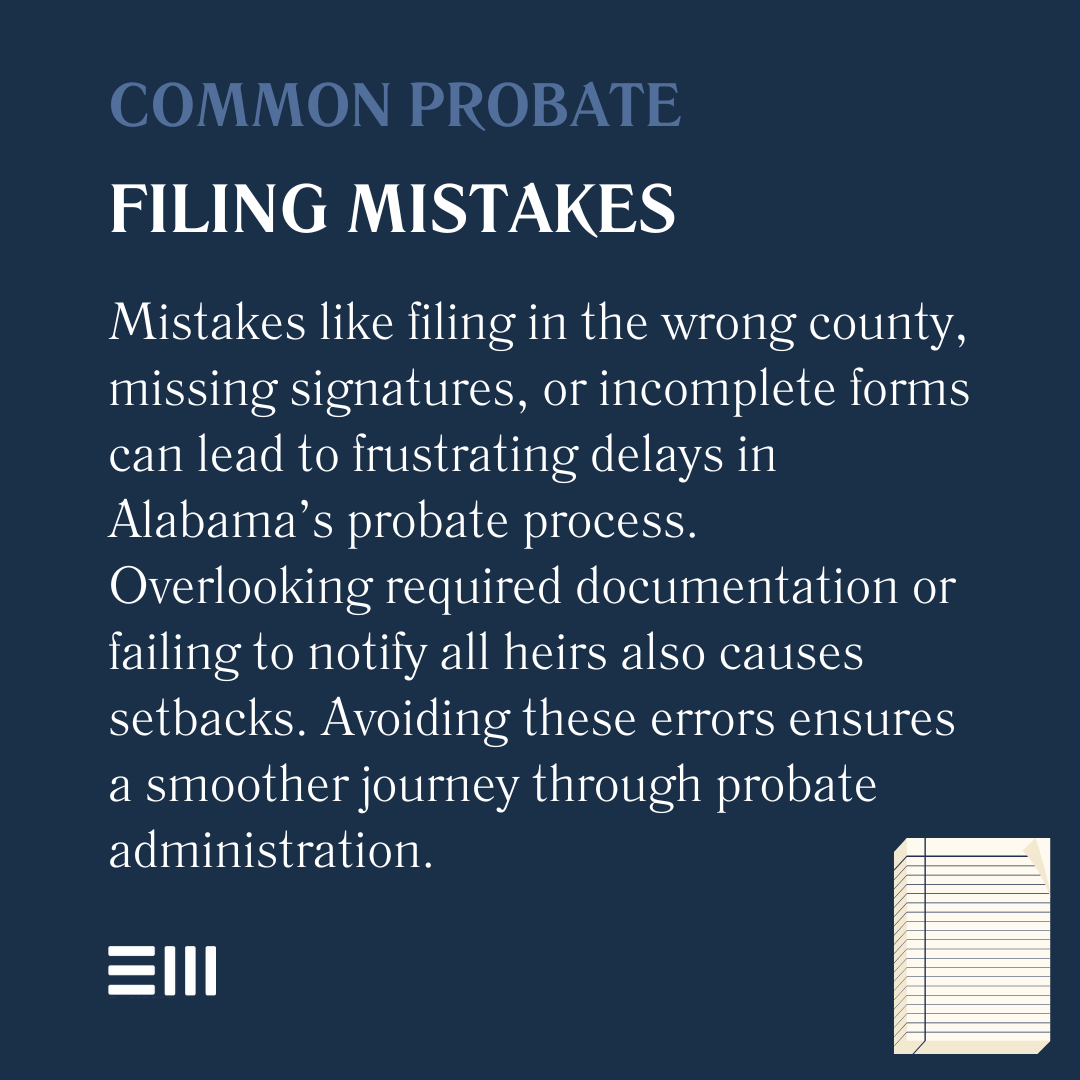Behind every probate filing lies a family's story—a cherished grandmother's final wishes, a parent's carefully preserved estate, or a sibling's unexpected passing.
From the courthouses of Birmingham to the quiet probate offices of rural counties, these documents transform mere paperwork into the legacy of a lifetime.
Yet many executors find themselves standing at the counter of their local probate court, wondering where to begin.
Required Documents for Filing
Proper documentation forms the foundation of successful probate filing in Alabama.
Each document serves a specific purpose in the process, and missing items can cause significant delays that affect both the estate and its beneficiaries.
- The original will, if one exists, must be filed in its unaltered form with any known codicils attached. The court will not accept photocopies unless special circumstances exist and are properly documented.
- Certified death certificate showing the deceased's last residence and date of death. Multiple copies may be needed for various aspects of estate administration.
- Petition for probate detailing basic information about the deceased and potential heirs. This document must include specific details about the deceased's assets, family relationships, and any known creditors.
- List of known heirs and their current addresses for court notification purposes. This should include all individuals who might inherit under Alabama law, even if they're not named in the will.
- Preliminary asset inventory estimating the estate's total value. This should cover all known assets, including real estate, vehicles, bank accounts, investments, and personal property.
- Filing fee payment, which varies by county but typically ranges from $200-500. Some courts require specific payment methods, such as certified checks or money orders.
- Bond application or waiver documentation if required by the court or will provisions. Bond amounts typically correlate with the estate's estimated value.
- Proof of executor's identity and any required qualification documents such as character affidavits or criminal background checks.
Having these documents properly prepared before filing helps ensure smooth acceptance by the court. Many courts provide document checklists specific to their jurisdiction, which can serve as valuable guidelines for preparation.
Filing Location Requirements
Alabama's probate filing requirements vary by location and circumstance.
Understanding where to file helps prevent jurisdictional issues and delays.
- Primary filing occurs in the county where the deceased lived at their time of death;
- Secondary filings may be needed in counties where the deceased owned real property;
- Out-of-state executors must appoint an in-state agent for service of process;
- Certain urban counties require electronic filing while rural courts may only accept paper documents; and
- Some counties require appointments for initial probate filings, while others accept walk-ins.
Adhering to local requirements ensures proper handling of your probate case from the start.
Initial Filing Process
The steps for initiating probate in Alabama follow a specific sequence.
Understanding this process helps executors prepare effectively and avoid common pitfalls.
- Contact the probate court to confirm local filing procedures and fee schedules;
- Complete all required forms using the court's preferred format and the required number of copies;
- Schedule any necessary appointments for document submission or judicial review;
- Pay required fees and obtain receipts for all transactions; and
- Request certified copies of key documents for future use during estate administration.
Following these steps in order helps establish a strong foundation for the probate process.
Notice Requirements
Alabama law mandates specific notifications during the probate process.
Proper notice protects both the estate and potential claimants.
- All known heirs must receive formal notice of the probate filing;
- Notice to creditors must be published in a local newspaper for three consecutive weeks;
- Known creditors should receive direct notification by certified mail;
- Interested parties must be notified of hearing dates and major proceedings; and
- Documentation of all notices must be filed with the court.
Meeting these notice requirements helps prevent future challenges to the probate process.
Common Filing Mistakes
Understanding frequent filing errors helps executors avoid delays and complications.
These mistakes often cause unnecessary setbacks in probate administration.
- Submitting incomplete or incorrectly completed forms requiring revision and resubmission;
- Filing in the wrong county or jurisdiction, necessitating transfer or new filings;
- Missing required signatures or notarization on key documents;
- Failing to include all known heirs in initial notifications; and
- Overlooking required supporting documentation for special circumstances.
Avoiding these common mistakes saves time and reduces frustration during the filing process.
Frequently Asked Questions About Probate Filing in Alabama
Alabama probate courts regularly address certain questions about the filing process.
These answers help clarify common concerns about initiating probate.
What Happens if No Will Is Found?
If no will is found, he court appoints an administrator following state intestacy laws, often prioritizing close family members.
How Much Does Filing for Probate Cost?
Filing fees vary by county and estate size, typically ranging from $200-500 for initial petitions.
Additional costs may include publication fees, certified copies, recording fees, and bond premiums if required. Some courts also charge separate fees for letters of testamentary or administration.
Can I File Without an Attorney?
While possible, self-filing increases the risk of errors and delays, especially for complex estates.
How Long After Death Should I File?
File within a reasonable time, ideally within 30 days, though Alabama sets no strict deadline.
What if Other Heirs Object to the Filing?
The court schedules hearings to address objections before proceeding with administration.
Trust Your Legacy to Experience
Filing for probate marks the beginning of honoring your loved one's wishes and securing their legacy. Our probate attorneys understand the complexities of Alabama's county-specific procedures and guide executors through successful filings daily.
With extensive experience in every probate court across Alabama, we help families navigate varying local requirements and procedures efficiently.
Schedule a consultation to ensure your probate filing meets all legal requirements. Our team brings extensive knowledge of local court procedures and relationships with probate offices across Alabama, helping you navigate this process with confidence.
From simple estates to complex probate matters, we provide the expertise needed to start your probate journey on solid legal ground.


